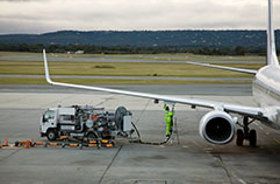IATA: South Africa has vast potential for SAF production

SOURCE; International Air Transport Association
July 11, 2024
BY International Air Transport Association
The International Air Transport Association called on South Africa to mobilize its experience, resources, and infrastructure to accelerate the development of sustainable aviation fuel (SAF) production. The call came as government and industry officials gathered in Johannesburg for the IATA Wings of Change Focus Africa conference.
“South Africa has vast potential to become a leading Sustainable Aviation Fuel (SAF) producer in the region. And there is a waiting market for SAF as airlines work to achieve net zero carbon emissions by 2050. More than a strategy in support of aviation’s decarbonization, it is a strategy for economic development and should be a top priority for the new South African government. Across agriculture, energy, and transportation, new jobs and industries are waiting to be created that would not only help fight poverty but also contribute to greater energy independence,” said Marie Owens Thomsen, IATA’s Senior Vice President for Sustainability and Chief Economist.
South Africa chaired the 2022 ICAO Assembly at which governments agreed to a long-term goal aligned with the aviation industry’s net-zero carbon emissions by 2050 commitment. The role of SAF in achieving this goal was emphasized by the ICAO CAAF/3 objective of a 5% average global reduction in aviation’s carbon emissions by 2030. As decarbonizing aviation will require global collaboration, it is critical that global or regional stakeholders like States, development banks, industry, academia and other relevant parties bring forces together to help countries with SAF potential to develop their industry.
Advertisement
Advertisement
“Airlines are ready and waiting to purchase SAF as evidenced by the fact that every drop of SAF produced has been purchased and used. But the production volumes are a minute fraction of what aviation needs. That’s why it is essential for governments of countries with production potential, such as South Africa, to embrace what is a unique win-win-win opportunity for economic development, energy transition, and decarbonized air transportation,” said Thomsen.
IATA highlighted several advantages for South Africa in developing SAF production, which have also been noted by a study undertaken by World Wildlife Fund (WWF):
Advertisement
Advertisement
- Feedstock Potential: South Africa has an abundance of feedstocks from which SAF can be derived including sugarcane low carbon by-products, and biomass from cleared invasive alien plants (IAPs). With respect to IAPs, harvesting them will come with other environmental benefits such as improved biodiversity and water security. In all cases, no feedstocks would compete with food production for land or water use in line with the ICAO sustainability framework.
- Significant Production Capacity: The WWF estimates that South Africa has the potential to produce between 3.2 and 4.5 billion liters of SAF annually. This will be more than meet domestic fuel demand (1.8 billion liters) and present an export opportunity, where policies will be central for realization. Achieving production at the higher range of potential would require the co-development of a green hydrogen capability.
- Existing Refinery Infrastructure: South Africa has existing refinery infrastructure which should be explored for brownfield investments—plant conversions or co-processing.
- Experience: South Africa has long experience in synthetic fuel production, particularly the Fischer-Tropsch method. Moreover, the country’s robust academic and research institutions also have a history of supporting innovations and technology for fuel production. It’s the time we see polices to enable their role in SAF deployment.
- Strategic Geographic Location: South Africa’s airports, particularly OR Tambo International Airport in Johannesburg and Cape Town International Airport, serve as important hubs for connecting flights within Africa and to other parts of the world.
To capitalize on South Africa’s SAF potential, IATA urges the government to adopt a strategic plan that should include four critical areas:
- Industrial Infrastructure: Accelerate the development of production capabilities by using existing industrial infrastructure (brownfield investment) as a competitive advantage in the development and scaling of SAF production.
- Pooling Resources: Identify opportunities to develop SAF by encouraging collaboration between the government, private sector, and international partners to pool resources and expertise.
- Incentives for Research and Development (R&D): Spur innovation to drive down costs, increase production volumes, and diversify source crops/production methodologies with tax incentives, grants, and subsidies for R&D in SAF technologies.
- Investment in Infrastructure: Support the development of necessary infrastructure (greenfield), such as biorefineries and green hydrogen production facilities with tax and other incentives.
Related Stories
MOL Group has produced a diesel fuel containing hydrotreated vegetable oil (HVO), and sustainable aviation fuel (SAF) at the refinery of Slovnaft in Bratislava. The quality of the products has been verified by radioisotope analysis.
More than 1.76 billion renewable identification numbers (RINs) were generated under the Renewable Fuel Standard in January, down from 1.91 billion generated during the same period of 2024, according to data released by the U.S. EPA on Feb. 20.
The U.S. EPA on Feb. 20 released updated small refinery exemption (SRE) data showing that 13 previously denied SRE petitions for Renewable Fuel Standard compliance years 2021 and 2022 are being reconsidered. No new SRE petitions were filed.
OMV Petrom has announced the start of construction for a sustainable aviation fuel (SAF) and renewable diesel (HVO) production unit at the Petrobrazi refinery in Romania. The new facility will have an annual capacity of 250,000 tons.
CVR pauses development of potential SAF projects pending regulatory, tax credit clarity
CVR Energy Inc. released fourth quarter financial results on Feb. 18, reporting reduced renewable diesel production. The company also said it is pausing development of SAF capacity pending clarity on government subsidies.
Upcoming Events










